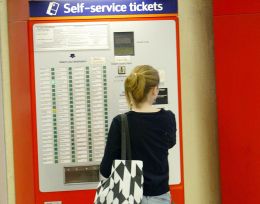Posted 21st November 2008 | No Comments
Liberal Democrats call for fares freeze as train companies announce big increases from January

“In the current economic climate our loyal customers would not thank us for increasing fares.”
A BIG hike in rail fares from the New Year has been attacked by the Conservatives and the Liberal Democrats, who have called for a fares freeze.
The reaction came after the Association of Train Operating Companies announced that many rail fares are to go up from 2 January, with regulated fares such as seasons and longer distance off-peak tickets increasing by six per cent.
Unregulated leisure and advance fares are due to go up by an average seven per cent over the network.
Atoc said that the extra revenue would go towards the multi-million pound cost of providing new and refurbished trains on their routes.
But the Liberal Democrats called on the Government to demand a one year freeze of fares increases to help struggling families during the economic crisis.
The cost to the train operators will be funded by cutting the budget for major road widening schemes.
Shadow transport secretary, Norman Baker said: “Commuters who rely on trains for their livelihoods are facing huge fare increases at a time when they are also struggling to cope with rising food and heating bills. Freezing their fares would give a huge boost to many hard-pressed families.
“The cost of rail fares has risen above inflation by 6 per cent since this Government came to power.
Conservative shadow transport secretary Theresa Villiers said:
"After a decade in charge of our railways, Labour have totally failed to get costs under control and left passengers to pick up the tab. At a time when families are feeling the pinch, it becomes even more important to ensure value for money."
“The Government has failed to give value for money and has left passengers to put up with crisis levels of overcrowding as well as rising fares, with the most packed trains running at over 170 per cent capacity."
Based on last July’s Retail Price Index of five per cent plus the pre-determined one per cent, all train companies but two will put up their Government-capped regulated fares by six per cent.
Southeastern’s will rise by an agreed eight per cent, and only Merseyrail will adopt just the RPI as a five per cent rise.
While unregulated fares will see an average national rise of seven per cent, CrossCountry’s will go up by an average of 11 per cent, First Capital Connect by nine per cent, Chiltern Railways by 7.5 per cent, East Midlands Trains and National Express East Coast by 7.4 per cent and South West Trains by 7.2 per cent.
But in sharp contrast, open access operator Grand Central is freezing fares on its services linking London with York, Northallerton, Thirsk, Eaglescliffe, Hartlepool and Sunderland until at least next May.
Managing director Tom Clift said: “In the current economic climate our loyal customers would not thank us for increasing fares.”
Atoc says the increased revenue will help pay for major investment – train operators are currently carrying out £800 million worth of work to bring in new trains, refurbish existing fleets and improve stations – and reduce subsidy by 40 per cent over the next six years in line with Government policy.
Association of Train Operating Companies chief executive Michael Roberts said: “In recent years, passengers have helped pay for 20 per cent more services - more than 90 per cent of which are now arriving on time.
“More than 80 per cent of rail journeys are made using price-regulated or discounted tickets, and in real terms overall fares have risen by just five per cent since 1996. Rail continues to be an attractive option for millions of people every day.”
Of the companies imposing the highest average unregulated increases, CrossCountry is refurbishing its entire fleet to provide 35 per cent more seats, First Capital Connect is spending £30 million to refurbish two fleets, East Midlands Trains is refurbishing its Class 158 diesel multiple units at a cost of £10 million and National Express East Coast will next year complete its £45 million High Speed Train refurbishment.
Also, Southeastern will introduce its £258 million Class 395 high speed services from Kent to St Pancras International next December and Southern will increase Brighton line capacity with its £10 million refurbishment of 17 Class 442 trains.
Elsewhere, London Midland’s new 148-carriage Desiro fleet is costing £190 million, and National Express East Anglia is spending £40 million on refurbishing 61 Class 315 electric multiple units.
